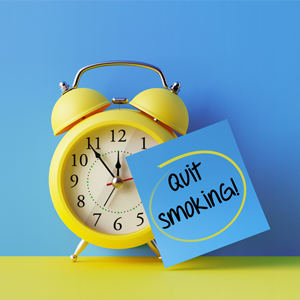
If you’ve finally reached a point in your life where you are ready to stop smoking, well done for making that decision! However, it’s not going to be easy and you need to make sure you are prepared. You will have to break your nicotine addiction, which may be difficult.
Before you decide on your quit day, draw up a list of reasons for why you want to quit. When you want to smoke after you've quit, pull out that list and remind yourself why you are doing it.
On World No Tobacco Day, here are a few ideas to get you started:
- I want to improve my health.
- I am doing it for my family.
- I am spending too much money on cigarettes.
- I want to be free from the addiction.
- I don't want to worry about when I can have my next smoke.
- I don't want to smell like cigarette smoke.
9 tips to help you quit smoking:
1. Pick a date
This is important because it gives you definite a goal. Pick a date – maybe the start of a week, or the beginning of a month. If you are worried about going cold turkey*, you can start cutting back, leading up to your quit day.
Setting a quit date also means you have time to create a plan and find people who will support you. "It's like taking a test – you've got to study," Glen Morgan, programme director of the Behavioral Research Program at the Tobacco Control Research Branch of the National Cancer Institute, told LiveScience.
According to CANSA, cold turkey* has been proven to be the most successful method of quitting – but also the most difficult.
2. Change your routine and avoid triggers
Have a look at your current routine and identify the times you smoke – with a cup of coffee in the morning, after a meal, or with lunch. You will need to make changes to your routine and break those habits. If you have coffee and a smoke in the morning, try drinking tea instead. Cigarette after a meal? Go for a short walk.
CANSA suggests you avoid smokers and anything that would make you want to smoke, especially for the first few days.

3. Wait it out – the craving will pass
The first few cravings will be tough – your chest will feel tight, you’ll be anxious, panicky and your brain will tell you that a cigarette will make you feel better.
Nicotine is what makes it so difficult for you to give up smoking and experts say that ex-smokers will crave nicotine one to two hours after they have quit. Your body wants the nicotine that you’ve become dependent on – and your blood pressure and heart rate will accelerate because you are being deprived.
But the good news is that cravings are time limited – they usually only last three to five minutes whether you smoke or not. The American Lung Association suggests finding something that will distract you – call a friend, sip a glass of water, take a walk, take some deep breaths or play a game on your phone.
These cravings will be the strongest during your first week if you’ve quit cold turkey – fortunately they will be less frequent as the days, weeks and months pass. But, don’t be surprised if you have a sudden craving six months after you smoked your last cigarette; just push through it.
4. Stay busy
Are you guilty of smoking when you’re bored? Once you’ve given up, those stretches of boredom will become longer and more difficult to handle. Find ways to keep yourself busy. Smokefree.gov, created by the National Cancer Institute, says that staying busy will also keep your mind off smoking (or rather the fact that you are not smoking) – they suggest: chewing gum, meditation, keeping your hands busy (play with a pen), going to a movie or spending time with non-smoking friends and family.

5. Stay hydrated
CANSA says drinking lots of water will help flush the nicotine from your body. When a craving hits and you feel as though you absolutely must smoke, try sipping ice cold water. This will help you to avoid snacking on unhealthy foods, which could lead to weight gain.
6. Get active
Smoking causes damage to your lungs, which is why you might be winded after walking up a flight of stairs or gasping for breath after running to catch the bus. Now that you have quit, get active – start walking more often and exercise your lungs. Besides, you could replace a bad habit with a good one, like Janice Gadd did. “I gave up smoking and picked up running. The fitter I got, the less I wanted to ruin that feeling by smoking.”

7. Remind yourself that it will get easier
The first few days after quitting are the hardest – you’ll battle with cravings, you’ll have nicotine-withdrawal headaches, you may have a sore throat or even insomnia. But just keep reminding yourself that it will get better and keep on reading your list of reasons of why you decided to quit.
CANSA says these side effects are normal and should improve within a few days, and disappear within 14 days. They say they the first two to three days are the most difficult.
8. There is no such thing as a 'special occasion' or 'crisis' cigarette
You may feel like you can handle just one cigarette during a stressful time at work or at a special occasion. But now that you are a non-smoker, you can never smoke again. One cigarette will lead to another and before you know it you will be back to your old habits.

9. Avoid gaining weight
Many people who are ready to quit smoking worry about the weight gain that is often associated with kicking the habit. However, this is not always the case and CANSA says not all ex-smokers gain weight. They suggest eating at regular times during the day and snacking on fruit between meals. Increase your water intake and make time to exercise. Picking up a few extra kilos is far better than putting yourself at risk of heart disease, stroke or cancer.
Why is it so hard to quit?
Health risks aside, you know that smoking is bad for you and it literally offers zero benefits. Yet, why is it so difficult to give up?
Think about the psychology behind it – when you quit smoking, you are quitting for life. You can never smoke again. That is what makes it so difficult to deal with. When you go on a diet, for example, you know that you are giving up sugar or alcohol for a limited period of time, and once you’ve reached your goal weight you can have the occasional sweet treat or glass of wine.
With smoking you can never have just one!
Disclaimer: There is no guaranteed way to quit smoking successfully but hopefully these tips will help you.
Have we missed a tip? Email mandy.freeman@24.com and share what worked for you when you quit smoking.
Image credit: iStock




 Publications
Publications
 Partners
Partners














